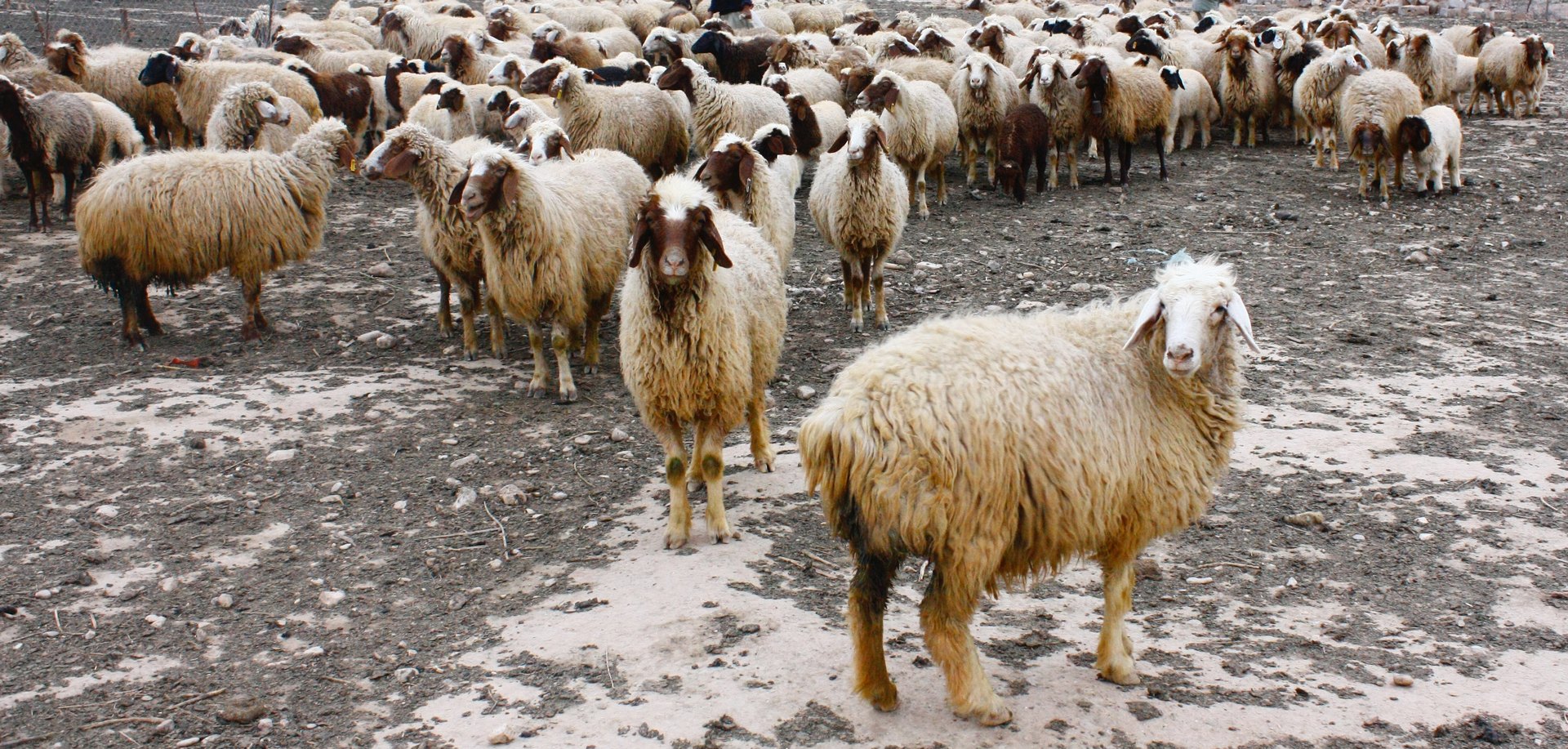Answers about
sheep in the Bible
Hebrew: צאֹן —transliteration: tson —meaning: sheep, or a flock of sheep or goats
There are different varieties of biblical sheep. Sheep are frequently mentioned in Scripture.
Sheep raised for wool, meat, trade or sacrifice
The flocks of Abraham and Isaac were possibly of the wild species still found in the mountainous regions of Iran (Persia) and Kurdistan.
After the Exodus, and as a result of trade with surrounding nations, other species were no doubt introduced into the herds of the people of Israel.
The care of a shepherd over his flock is referred to as illustrating God’s care over his people (Psalm 23:1-2; 74:1; 77:20; Isaiah 40:11; 53:6; John 10:1-5, 7-16).
“The sheep of Palestine are longer in the head than ours, and have tails from 5 inches [12.7 centimeters] broad at the narrowest part to 15 inches [38.1 centimeters] at the widest, the weight being in proportion, and ranging generally from 10 to 14 lbs., but sometimes extending to 30 lbs. The tails are indeed huge masses of fat.” —John Cunningham Geikie, The Holy Land and the Bible: A Book of Scripture Illustrations gathered in Palestine, (1887, abridged edition: 1903
“Fat tail”
You shall also take the fat from the ram and the fat tail… —Exodus 29:22 excerpt
The tail here so frequently referred to in the Levitical sacrifices no doubt refers to the sheep’s rump (Leviticus 3:9; 7:3; 9:19; Exodus 29:22).
Wool harvesting
Sheep-shearing was generally an occasion of great festivity (Genesis 31:19; 38:12-13; 1 Samuel 25:4-8; 1 Sam. 25:36; 2 Samuel 13:23-28).
Figurative sheep
Figuratively, people may be like sheep, easily led, one way or the other. In a sense, we have all been like sheep.
All we like sheep have gone astray; We have turned, every one, to his own way… —Isaiah 53:6 NKJV
For the idols speak delusion;
The diviners envision lies,
And tell false dreams;
They comfort in vain.
Therefore the people wend their way like sheep;
They are in trouble because there is no shepherd. —Zechariah 10:2 NKJV
But when He [Christ] saw the multitudes, He was moved with compassion for them, because they were weary and scattered, like sheep having no shepherd. —Matthew 9:36 NKJV
For you were like sheep going astray, but have now returned to the Shepherd and Overseer of your souls. —1 Peter 2:25 NKJV
Sheep and goats in Matthew 25 (judgment at the beginning of the Millennium)
“When the Son of Man comes in His glory, and all the holy angels with Him, then He will sit on the throne of His glory. All the nations will be gathered before Him, and He will separate them one from another, as a shepherd divides his sheep from the goats. And He will set the sheep on His right hand, but the goats on the left. —Matthew 25:31-33 NKJV
What does that mean? This is speaking of Christ’s Second Coming. In Christ’s behavior-based analogy, the flocking, obedient sheep are Believers (dependent on The Great Shepherd), and the independent, wandering goats are unbelievers (arrogant, aggressive, rebellious), rejecting the Shepherd and having no interest in His Gospel.
Dr. John F. MacArthur of Grace Community Church and The Master’s Seminary explains,
This verse speaks of the earthly reign of Christ described in Revelation 20:4-6. The judgment described here in verses 32-46 is different from the Great White Throne judgment of Revelation 20:11-15. This judgment precedes Christ’s millennial reign, and the subjects seem to be only those who are alive at His coming. This judgment is sometimes referred to as the judgment of the nations, but Jesus’ verdicts address individuals in the nations, not the nations as a whole (cf. Rev. 20:46). —John F. MacArthur, Litt.D., D.D., The MacArthur Study Bible
- What are the COMINGS OF CHRIST?
- The Kingdom of God—What, when and where is it? Answer
- What is the Millennium?
Hebrew words for sheep
צאֹן —transliteration: tson —meaning: sheep, goats, flock, small cattle —occurrences: 274 times in Scripture
שֶׂה (just 2 letters) —transliteration: zeh —meaning: lamb —occurrences: many in combination with other letters, e.g. miz·zeh (63), haz·zā·hāḇ (59), wə·zeh (51), ū·miz·zeh (13), hă·zeh, haz·zeh, kā·zeh, lā·zeh, ū·ḇā·zeh, ḇā·zeh, wə·ḵā·zeh, ḵā·zōh, kā·zōh, zōw, zōh, baz·zā·hāḇ, baz·zā·hāḇ, bə·zā·hāḇ, haz·zā·hāḇ, kaz·zā·hāḇ
שֶׂה —transliteration: seh —meaning: one of a flock, a sheep (or goat) —occurrences: 47
כֶּבֶשׂ —transliteration: kebes —meaning: a lamb —occurrences: 107
כֶּשֶׂב —transliteration: keseb —meaning: a lamb —occurrences: 13
כִּבְשָׂה —transliteration: kibsah or kabsah —meaning: ewe lamb —occurrences: 8
כִּשְׂבָּה —transliteration: kisbah —meaning: a ewe lamb —occurrences: 1 (Leviticus 5:6)
אִמַּר —transliteration: immar —meaning: a lamb —occurrences: 3
טָלֶה —transliteration: taleh —meaning: a lamb —occurrences: 2
טְלָא —transliteration: tela —meaning: lamb —occurrences: 1
אַיִל —transliteration: ayil —meaning: a ram —occurrences: 183
דְּכַר —transliteration: dekar —meaning: a ram —occurrences: 3
Greek words for sheep
πρόβατον —transliteration: probaton or probation —meaning: a little sheep —usage: a sheep or possibly any like-sized quadruped that grazes out to pasture in a herd (e.g., goats, small cattle), but especially sheep —occurrences: 39 times in Scripture
προβατικός —transliteration: probatikos —meaning: pertaining to sheep; of sheep —occurrences: 1 (John 5:2)
ποίμνη —transliteration: poimné or poimne —meaning: a flock —occurrences: 5
μηλωτή —transliteration: mélóté —meaning: a sheepskin —occurrences: 1 (Hebrews 11:37)
More Information
- Shepherds in the Bible
- Predators of sheep: wolf, lion, bear, eagle, robbers, thieves, invading tribes and armies
- What is a sheep-fold?
- Ram
- Lamb
- Wool
- Sheep market
- shearing house
- Sheep Gate
- About goats in the Bible
- What does the Bible say about GOATS?
- Agriculture in the Bible
- FARMING in the Bible
